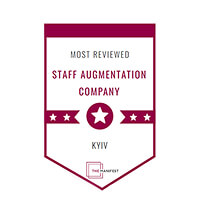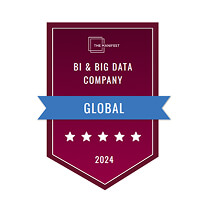ETL Development Services for Scalable Data Integration
We offer full-cycle ETL development services: from automatic data collection from CRM, ERP, websites, and consolidation into a single stream to building pipelines for individual requests.
Get quick access to aggregated data from various sources, regardless of their volume.
Check customer records, orders, financial transactions, inventory balances, event logs, and other information whenever you need it.
Quickly improve operational processes and strategic decisions to scale and stay ahead of the competition.
for business intelligence succesfull implementation

By providing your phone number, you agree to receive SMS notifications. Your data will be processed in compliance with applicable privacy laws. For more information, please review our Privacy Policy. You may opt out at any time.
Our ETL Development Services
Data Migration Services Using ETL
Data migration is the process of extracting information from different systems while preserving its structure, accuracy, and security and uploading it to the target platform. Such solutions are suitable for companies that are switching to a new CRM or ERP, changing their IT infrastructure, launching new services, or combining data from multiple sources. In the process, the data is cleaned of duplicates and errors, transformed, and transferred to the new environment in a ready-to-use form.
Our ETL development team offers solutions that prevent the loss of critical data, help preserve the history of customer interactions, ensure business continuity, and reduce the time required to adapt to a new system.
Scalable ETL Pipeline Development
We offer services for the ETL pipeline development — automated scripts that ensure stable data processing: from extraction to loading into the target system. Pipelines are used to regularly combine information from CRM, ERP, CMS, API services, and internal databases. These customized ETL solutions are necessary for businesses that work with multiple data sources, seek to centralize analytics, and automate reporting.
In the process of development, our team takes into account the rules of information processing, frequency of updates, volumes, structure, data types (structured, semi-structured, unstructured), and possible input errors. We set up monitoring, logging, and notifications for quality control. As a result, you get a system that maintains a high speed of request processing even when the workload increases.
Data Integration Services
Data integration is the process of combining information from multiple sources into a single, consistent system. We provide an ETL service that covers the full cycle: from source and structure analysis to implementation of automated solutions with quality control.
This solution is suitable for companies that work with ERP, CRM, CMS, HRIS, marketing and financial platforms and want to bring all data into one repository or reporting system. We map fields, unify formats, detect conflicts (duplicates, inconsistencies, data format, etc.), and set up regular updates — by event, schedule, or in real time.
In the process, we develop an optimal architecture tailored to the client’s scale and needs. This may include the ETL process development or combined API-based approaches, depending on the type of systems and integration goals.
Data Quality Assurance and Transformation
Data transformation is a key stage in building an analytical system. We do not just transfer data from one system to another, but prepare it for further use: we normalize formats, unify the structure, and clean it from duplicates, empty or incorrect values.
Quality assurance involves integrity checks, implementation of control mechanisms, logging, validation at each stage, and failure notifications. This helps to avoid information loss, errors in reports, and unstable operation of connected systems. As a result, ETL as a service allows businesses to get a turnkey solution for data transformation without the cost of maintaining a complex infrastructure.
Automated and Real-Time Data Loading
Systems with a complex or dynamic structure require adaptive solutions. Flexible ETL development allows you to customize loading for specific tasks — regular updates, streaming, or event processing. We take into account the sources, amount of data, time sensitivity, and criticality of updates to build a stable and scalable process. This solution is suitable for companies that work with transactional systems, real-time services, or have high requirements for analytics efficiency.
Automation eliminates the need for manual input, reduces the risk of errors, and speeds up data transfer to the node. Our ETL services work seamlessly with both classic scenarios and high-tech systems.
Legacy System Data Integration
Many companies still store some important data in outdated systems, such as on-premises databases, old versions of CRM or accounting programs that do not have open data interfaces (APIs) or are no longer supported by the developer.
We analyse available formats (e.g., CSV, DBF, local SQL databases), adapt processing schemes, and implement extraction mechanisms even in the absence of a direct connection. We pay special attention to the preservation of historical data and its correct transformation so that it is up-to-date and ready for further use in the new system.
For this purpose, we use ETL process development taking into account the limitations of the source, the specifics of the target platform, and the client’s needs in terms of frequency of updates and level of data detail.

We provide a full cycle of data work — from source integration to automatic loading and transformation. Our ETL development services are flexible, scalable solutions that adapt to business objectives, automate processes, and guarantee data quality at every stage.
Stages of ETL development
Data Extraction
- At the first stage, we connect to all the necessary sources — databases, CRM, ERP, cloud services, APIs.
- We determine what data should be transferred, in what format, and at what frequency.
- We determine what data should be transferred, in what format, and at what frequency. The ETL service involves setting up a stable collection mechanism that works without manual intervention.
Data Transformation
- From architecture to deployment, we process data in accordance with the requirements of the target system or business logic: we remove duplicates, adjust formats, and standardize the structure.
- We determine what data should be transferred, in what format, and at what frequency.
- The ETL service involves setting up a stable collection mechanism that works without manual intervention.
Data Loading
- The final stage is the transfer of prepared data to the warehouse, BI platforms, or other target systems.
- We use proven technologies, such as Azure Data Factory, SQL Server Integration Services (SSIS), Databricks, and streaming loading mechanisms.
- Our customized ETL solutions ensure the reliability and scalability of the process.
Three reasons to choose our
ETL services
Development
Expertise in ETL and Data Integration
Scalable and Custom Solutions for Any Industry
Reliable, Fast, and Secure ETL Pipelines
Why businesses choose our ETL development services
To ensure reliable data movement, we design and implement ETL pipelines that control how data is extracted, transformed, and delivered to your analytics environment. This gives you stable reporting and predictable processing performance as volumes grow.
Quick start and initial results in just 2 weeks
25+ BI and Finance experts without hiring pain
Proven BI delivery for 8 years in 22 industries
More than 70 happy clients across 5 countries
Save 35% compared to W-2 payroll or contractors
Full end-to-end delivery, from reporting to support









Need dependable ETL pipelines built for scale? Get a data integration solution designed for accuracy, performance, and long-term reliability.
ETL Development Case Studies

Healthcare
“Dobrobut” clinics network
Result:
- Clinic's directors got daily updated P&L report;
- The management uses daily dashboard with budget/actual analysis on operational indicators;
- Dashboards combine data from ERP and the Doktor Eleks medical system .

Logistics
Meest China
Result:
- Dashboards combine data from ERP and CRM;
- Routes margin is automaticaly calculated in dashboards and monitored every day by management;
- Daily generated Profit & Loss report;

Manufacturing
Simpatik – cosmetics factory
Result:
- Integrated Power BI with ERP. The volume of the ERP database for analytics is 800 GB per year.
- We created a data mart and implemented the calculation of the main analytical metrics on DAX
- Connected Excel with Power BI data model in Azure Analysis Services.
Industry-focused case studies designed for your needs


ETL Development FAQ
How can ETL benefit my business?
ETL helps centralize data, ensure its integrity, and automate processing. You get a single, reliable source for analytics, reports, and decision-making. This reduces time, reduces the risk of errors, and opens up opportunities for scaling.
How long does it take to implement an ETL solution?
It depends on the number of sources, the complexity of the transformations, and the update frequency requirements. Basic integration takes 2 to 4 weeks. Projects with many systems and custom scenarios can take longer, up to 2–3 months.
What ETL tools and technologies do you use?
We work with the following tools:
- Azure Data Factory — for managing cloud processes;
- SQL Server Integration Services (SSIS) — for local scenarios;
- Databricks — for processing large volumes;
- Power BI — for integrating results into reporting.
We also use Python, APIs, webhook solutions, and our own custom ETL mechanisms.
Can you optimize my existing ETL workflows?
Yes. We audit the structure, logic, and load. Optimization can include simplifying pipelines, speeding up loading, reducing duplication, and implementing monitoring. Our ETL development services include not only the technical part but also the business context.
Can you combine multiple ETL processes into a unified workflow?
Yes, this is a common task. We evaluate the similarity of logic, sources, and target systems, and then propose the ETL development services that minimize duplication of information and simplify the subsequent support of the data processing infrastructure.
What types of data formats and structures can your ETL handle?
Our ETL services cover work with:
- relational databases (SQL)
- tabular and semi-structured formats (CSV, XLSX, JSON, XML)
- data from API responses;
- cloud sources (Google Sheets, Azure, Amazon S3).
It is also possible to process semi-structured and outdated formats, with preliminary conversion if necessary.













